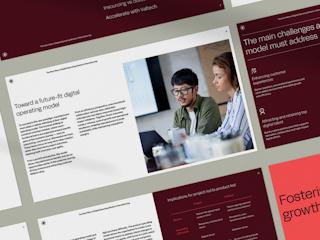The massive shift
The shift towards profits will impact everyone operating a business, be it B2B or B2C. Most businesses have already been impacted somewhat. It’s likely, however, that they’ve only seen the tip of the iceberg if this shift continues for years to come, which we expect. The most cyclical industries have been used to these changes over time. But most companies that are based on online business models have never been through it before.
Competition in the ecommerce and digital landscape matured from a stage of basic competition with space for everyone willing to invest and dare, to a more mature phase with an increased focus on winning the mind of the consumer in your market. Now, we see a move towards a more advanced stage with a focus on next level customer experiences, customer lifetime value, business process optimization and sustainability.
This is where we believe that a massive shift comes into play. As massive shift unleashed due to market conditions and market maturity.![Massive leadership - VISUAL FINAL[65].png](/globalassets/00-global/02-images/04-insights/pingel-202206-insight/massive-leadership---visual-final65.png)
The massive shift is actually very simple; there are mainly five parameters describing it:
1) From scalability to profitability
For years, companies have been searching for massive scalability in order to grow faster. But now, all companies need to look for profitability through focus on core processes and costs. This goes deeper than just applying a “scalability for growth" mindset. It requires a lean mindset; a mindset that has previously been postponed or neglected in the quest for growth. This is a tough challenge, and for many not as “fun” as finding growth scalability.
2) From recruitment to retention
It’s probably clear to anyone that it’s cheaper and simpler to retain a customer than to acquire a new one. In recent years, customer acquisition cost has increased significantly, and from a profitability perspective, the alternative cost of losing a customer increases, leading to an even further urgency to retain your customers before acquiring new ones. To be honest, loyalty has not been an aspect that has kept many awake, and brake-through loyalty initiatives have been limited within digital. Mastering retention and loyalty will be even more important in the future.
3) From more is better to sustainability
Since the birth of the Internet and multichannel, constant growth has been the paradigm. More content, more and better media (high quality pictures and videos), more touchpoints, and more data. Basically, growth initiatives all over. It has increased the amount of data we are sending around and created huge complexity in most organizations. Less and transparent rather than more presence must become the norm for better for sustainability and profitability in the future.
4) From start to stop
Typically, the biggest problem for companies was that they did not know where to start, which led to almost endless digital initiatives and transformations. While several studies show that most of them fail, in a profit perspective this will change significantly as the new paradigm will focus on what to stop while looking at individual business cases with much more scrutiny. More is NOT better, less is. A lot of the marginal initiatives introduced have limited or no impact; especially if they are not a prioritized and mission critical effort for the company. Across the organization less will have to be the norm, and most organizations will instantly benefit.
5) From mushrooming to agility
Often, companies have mushroomed when it comes to their business models and tech landscape because it all created growth. However, mushrooming your tech stack with several integrations and custom logic have pushed many companies to be stuck with legacy. But in the highly volatile environments we are entering, agility is now more than ever the key for success. This eventually means that companies need to clean up their business models and tech stacks to remove the “mushrooms.” With this move, they can become more agile in their adoption to market changes. It is really difficult, though, as many processes and routines need to be demolished, but it must be acted upon.
But the biggest challenge of them all is the Leadership challenge.
The shift in leadership ahead
If you can agree to the shift ahead, then the next challenge is even bigger. First, the digital natives that are the largest part of the digital workforce in most organizations have never tried anything other than growth. Secondly, a culture built around the growth paradigm has been established in digital organizations and functions. And as we all know, culture and habits are more than sticky. Both of these challenges call for a major turnaround in leadership.
There are four core leadership challenges that need to be addressed and discussed across digital business operations: Lean leadership, Motivational leadership, Predatory leadership, and not least Sustainable leadership.
The most relevant solution for you as a leader is to seek inspiration in the approach to crisis management. Scott Galloway, professor at the New York University Stern School of Business, is known for the following approach stating that there are only three things to remember:
- Acknowledge the issue
- Top guy / gal takes responsibility
- Over-correct
The situation we are describing is obviously not the same as in larger emergency crisis situations. But the approach to follow is the same. Recognize the problem, address it by leading the way as a leader by virtue of your experience, and spend a disproportionate amount of your time on it. Otherwise, you won't solve the challenge at hand.
Read the full article here by Carsten Pingel, VP Strategy Valtech and Toke Lund, CEO Enterspeed.











